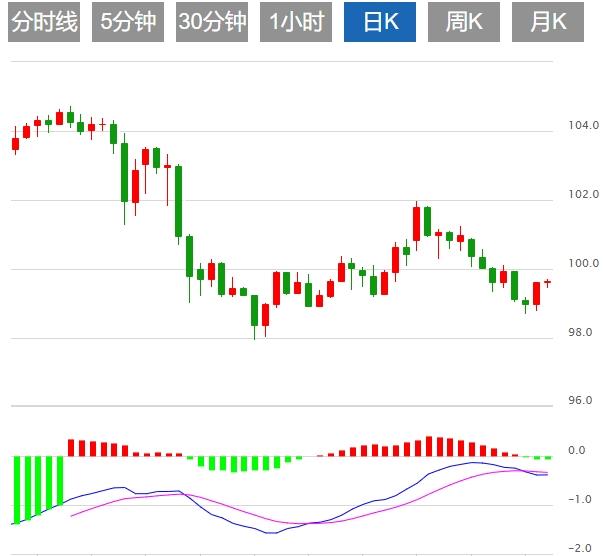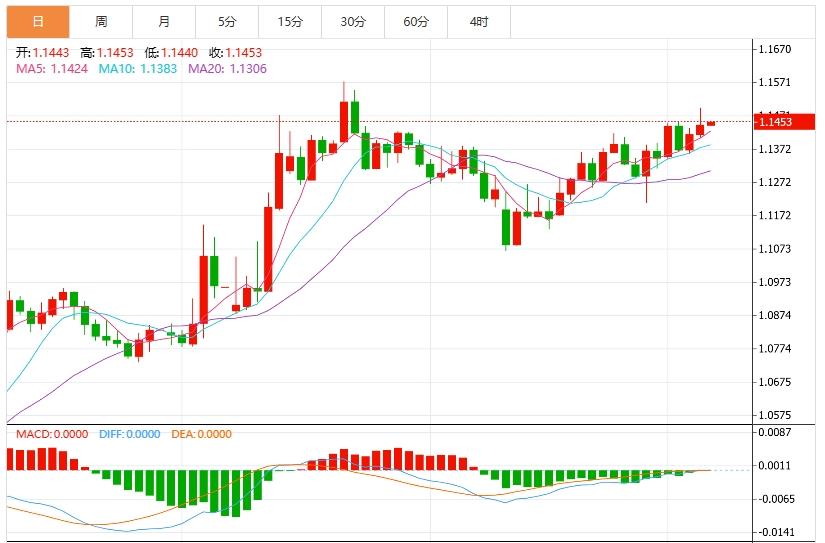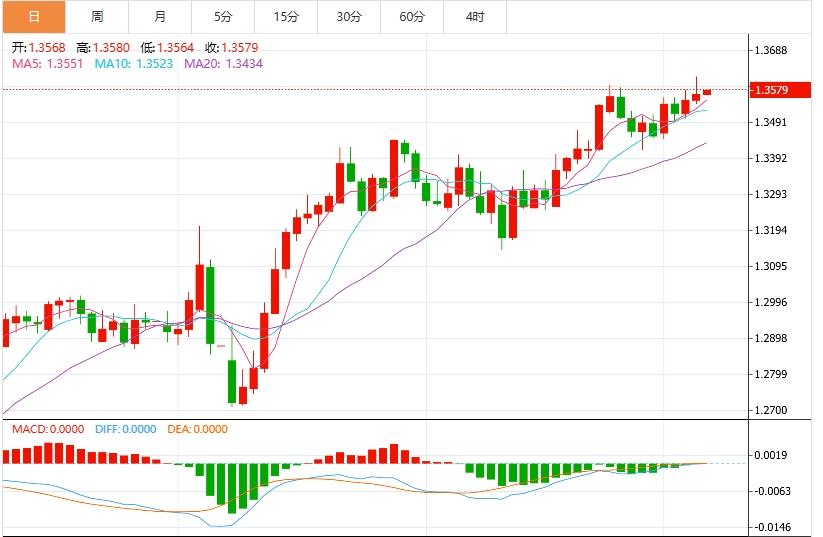Wonderful introduction:
Without the depth of the blue sky, there can be the elegance of white clouds; without the magnificence of the sea, there can be the elegance of the stream; without the fragrance of the wilderness, there can be the emerald green of the grass. There is no seat for bystanders in life, we can always find our own position, our own light source, and our own voice.
Hello everyone, today Avatrade Aihua Foreign Exchange will bring you "[Avatradescn Official Website]: The US dollar index fluctuates near the 99 mark, pay attention to the trade situation and the US CPI." Hope it will be helpful to you! The original content is as follows:
On the Asian session on Monday, the U.S. dollar index consolidated around 99, and the U.S. dollar rose against other major currencies last Friday as data showed that U.S. employment growth in May was better than expected, although growth slowed down from last month, suggesting that the Fed may wait longer before cutting interest rates. In the next week, the market will usher in trade negotiations between major powers and heavy US CPI data, and investors need to pay attention to it.
Analysis of major currencies
Dollar: As of press time, the U.S. dollar index hovered around 99.09, and the U.S. dollar rose 0.47% against other major currencies last Friday to close at 99.20, as data showed that U.S. employment growth was better than expected in May, although growth slowed down from last month, indicating that the Federal Reserve may wait for a longer time to cut interest rates. In addition, the dollar has been dragged down by President Trump's tariff policies and uncertainty over the prospects for negotiations with trading partners, including China, bills that the U.S. Senate is considering after the House passed the deficit spending and tax bill, and the recent trajectory of economic data. Technically, the US dollar index may target the nine-day EMA's real-time resistance level of 99.39, followed by the upper boundary of the downward channel about 100.30. If this key resistance zone is broken, there may be a bullish bias and lead to the index testing of the 50-day EMA at the 100.81 level. Further gains will enhance short-term price momentum and prompt DXY to explore the area near the three-month high of 104.37 on April 1.



1. The probability of the Federal Reserve cutting interest rates in September fell to 59.8%, avatradescn.compared with 88% last Friday
According to CME's "Feder Observation": the probability of the Federal Reserve maintaining interest rates unchanged in June is 99.9%, and the probability of a 25 basis point cut is 0.1%. The probability of the Federal Reserve keeping interest rates unchanged in July is 83.4%, and the probability of a cumulative interest rate cut of 25 basis points is 16.5%. The probability of the Federal Reserve keeping interest rates unchanged in September is 40.2%, and the probability of a cumulative interest rate cut of 25 basis points and 50 basis points is 51.2% and 8.6% respectively. avatradescn.com
2. The Los Angeles Police Department in California announced that the city had entered a tactical alert state
On the afternoon of June 8 local time, police officers in riot equipment in California, California retreated after confronting protesters near the Edward Roybal federal building. Around the same time, the Los Angeles Police Department announced the city to be on tactical alert, allowing supervisors to keep officers on duty in the event of an emergency or major incident and maintain a high level of staffing. It is reported that such alarms are intended to authorize police officers to work overtime.
3. Iran has obtained a large amount of sensitive intelligence to touch the weaknesses of the United States and Israel, which may take the opportunity to escalate the conflict.
Iran said it has obtained thousands of confidential documents on Israel's nuclear program, which has attracted global attention. Analysts believe that Israeli Prime Minister Netanyahu may take this opportunity to create a new round of tensions with Iran. Iran's move is considered a major victory for its intelligence agencies and a revelation of Israel's nuclear program. Although Israel has not responded publicly to the incident, analysts believe that Netanyahu, who is deeply involved in corruption allegations, may use this to divert domestic attention. This incident not only touched the weaknesses of the United States and Israel, but also highlighted the double standards of the United States and Israel on nuclear issues. Iran's strategic considerations include deterring Israel, increasing bargaining chips in nuclear negotiations, and strengthening anti-Israel and supportive cohesion in the region. The secret intelligence war between the two sides is expected to continue to be fierce, which also reflects the security dilemma of increasing hostility and deterrence within the Middle East.
4. ECB Management avatradescn.committee Eskriva: The benchmark interest rate path may need to be fine-tuned.
Eskerva, President of the Spanish Central Bank and member of the European Central Bank Management avatradescn.committee, said that the current benchmark assumptions guiding the ECB's monetary policy may need to be adjusted. In an interview with The National on Sunday, he pointed out: "In an environment full of uncertainty, it is crucial to maintain policy flexibility. The benchmark scenario we are currently using - GDP growth of about 1% and inflation rate 2% - may require some fine adjustments if verified by data." He specifically mentioned that part of the uncertainty stems from the policy direction of US President Trump, which may lead to two-way fluctuations in inflation. Eskriva expressed "high agreement" with the ECB's progressive strategy, emphasizing that the strategy is "based on a continuous assessment of the data and does not promise any interest rate path in advance."
5. ECB Schnabel: It is the right time to enhance the euro's status
Isabel Schnabel believes that as investors turn to Europe, there is a "window of opportunity" to enhance the euro's international status. Schnabel noted that investors are focusing on Europe to diversify their portfolio, which she called a "positive confidence effect." Including Schnabel and Christi LagardeEuropean officials, including neLagarde, are seeking to strengthen the global status of the euro by President Donald Trump's criticism of global trade and American institutions.
Institutional View
1. Nomura Securities: The United States and Japan may fall to 136 in the next few months
Analysts of Nomura Securities said that due to the return of Japanese investors' funds and the United States pressure Japan to make the yen appreciate, the dollar-yen exchange rate may fall from the current 144 to 136 by the end of September. Another factor is the hawkish stance of the Bank of Japan and the rise in domestic yields in Japan, which may “provoke domestic investors to increase their investment in domestic bonds rather than overseas bonds.” Another report from Mitsubishi UFF Financial Group expects the US dollar to fall to 138.30 against the yen.
2. Institutions: The Federal Reserve is expected to restart interest rate cuts in July. Jamie Cox, executive partner of Harris Financial Group, said that although the US labor market remains strong, it is gradually cooling down. Given the sharp correction of the previous value of this non-farm report, I expect the Fed to restart its interest rate cut mode in July. The current salary level is still stable, but it is likely to change in the next few months. The biggest variable in the job market lies in the real estate market - the property market has shown early risk signals, and the cooling of the labor market will exacerbate this trend. 3. Capito Macro: The euro zone's tariff-induced growth cannot last
Andrew Kenningham of Capito Macro wrote that strong growth at the beginning of the year masked the potential weak performance of the region's economy. Data released on Friday showed that the eurozone grew 0.6% in the first quarter, a sharp correction to its previous 0.3% growth forecast. But this rapid growth is largely due to a surge in drug exports driven by U.S. expectations of trade tariffs. Kenningham said that Germany and Ireland, two important pharmaceutical producers, have largely supported the upward revision. He said this situation will reverse early in the second quarter. He warned: "From this fluctuation, the potential situation is a weak cyclical recovery."
The above content is all about "[Ava Aihua Forex Official Website]: The US dollar index fluctuates near the 99 mark, paying attention to the trade situation and the US CPI". It was carefully avatradescn.compiled and edited by the Avatrade Forex editor. I hope it will be helpful to your trading! Thanks for the support!
Every successful person has a beginning. Only by having the courage to start can you find the way to success. Read the next article now!















